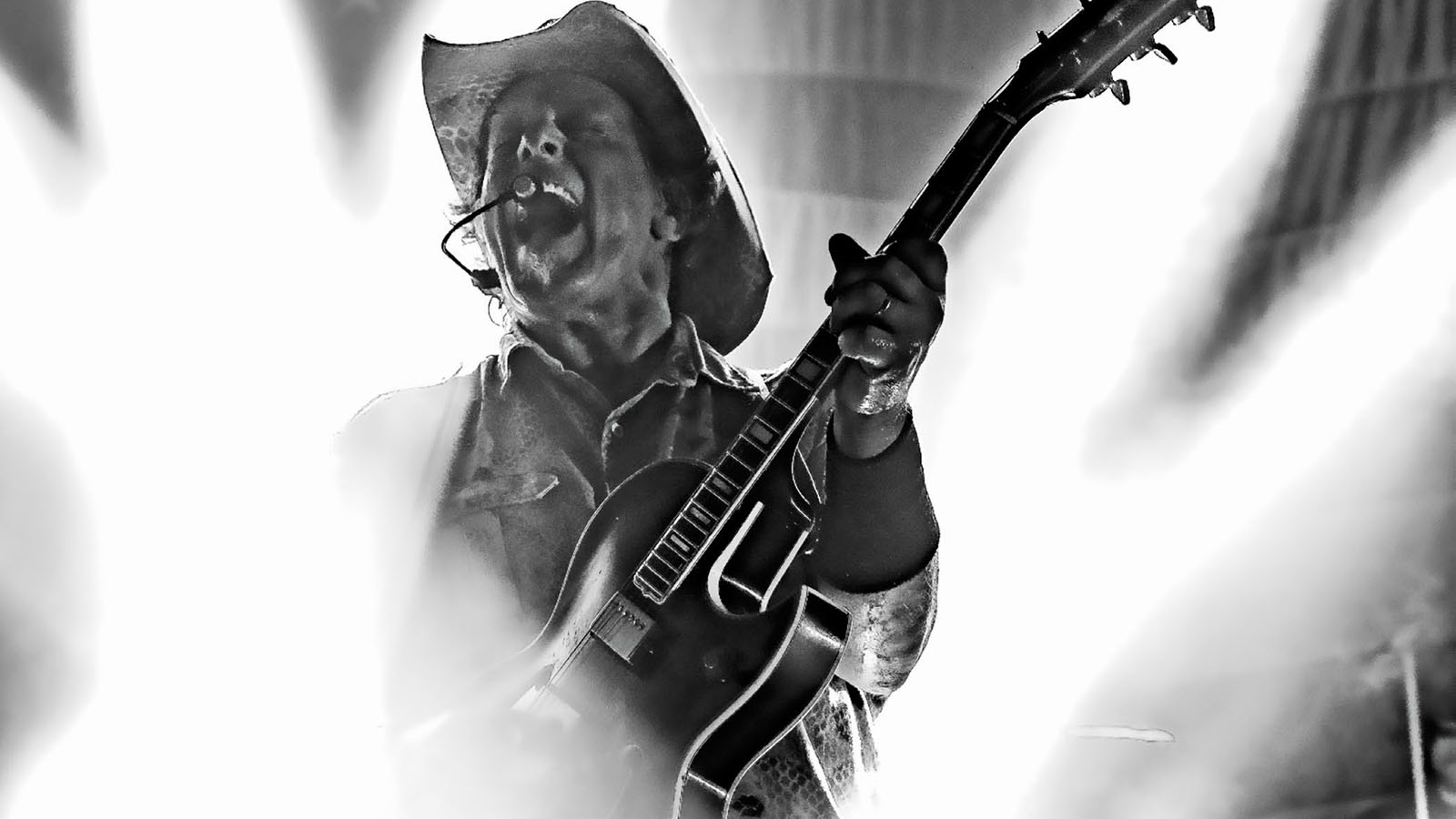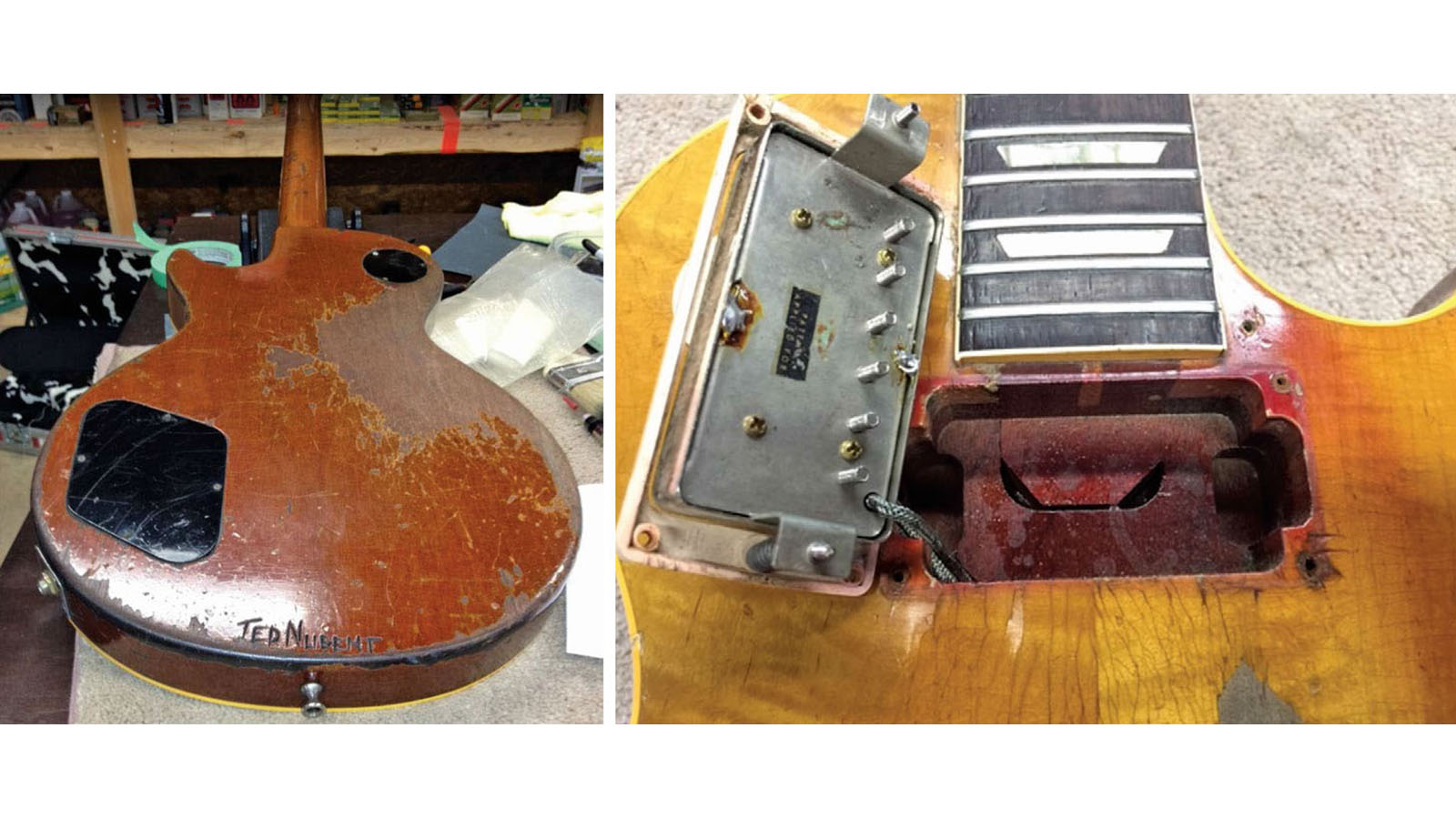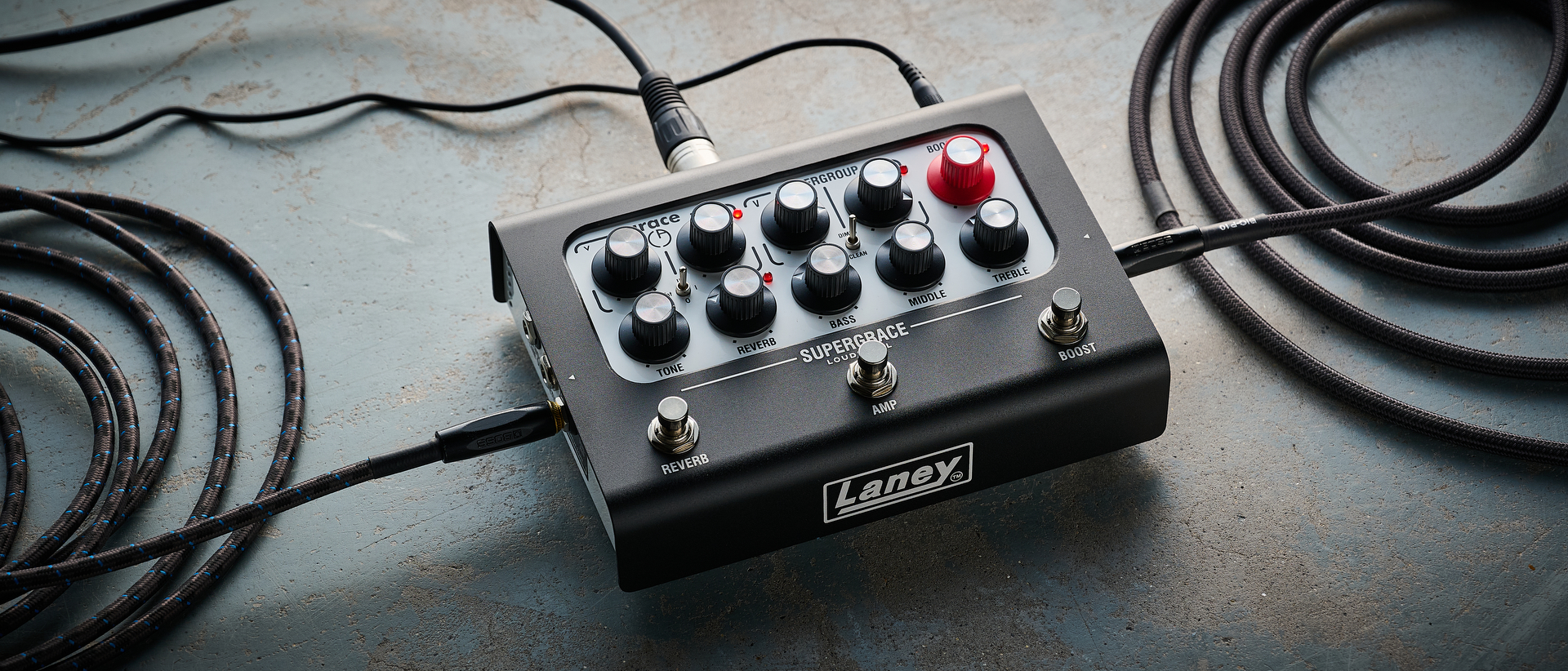Catching Up with Ted Nugent, the Motor City Madman Behind 'The Music Made Me Do It'
“I bring the primal goo into the studio.” “You know, the primal goo can be figurative. But with me it’s literal."

All the latest guitar news, interviews, lessons, reviews, deals and more, direct to your inbox!
You are now subscribed
Your newsletter sign-up was successful
When Ted Nugent rings Guitar World, it’s just past breakfast time. But the 70-year-old Motor City Madman has already had a full day. “I sat in a freezing fucking tree for four hours this morning, questioning my own sanity!” he announces by way of introduction.
What follows is a characteristically high-energy, high-velocity monologue from Nugent, in which our narrator, perched high in said tree, spots a buck emerging from a swamp on his vast Michigan property. Then, with winds howling and leaves smacking, he takes a sip of hot coffee from his Thermos and raises his bow and arrow to shoot the animal “right through the fucking heart.”
And just what, exactly, does any of this have to do with guitar playing?
According to Ted, everything.
“The two worlds really enhance each other,” Nugent explains. “Because I come out of that tree and I walk into the studio, I take my boots off, and… there’s a guitar! I grab that motherfucker and fire happens!”
The latest fire to shoot forth from Uncle Ted’s six-string is the new The Music Made Me Do It. The spirited, steamrollering collection is everything you’d expect from Nugent, replete with plenty of gonzo riff-rock (“Cocked, Locked & Ready to Rock,” “The Music Made Me Do It,” the appropriately-titled “BigFunDirtyGrooveNoize”) hopped-up r&b/blues boogies (“I Love Ya Too Much Baby”) and odes to the hunting life (new versions of his own “Fred Bear” and “I Just Wanna Go Huntin’”), as well as a smattering of more restrained and evocative instrumental tracks (“Sunrize” and its counterpart, “Sunrize Fender [Fender Bass VI Solo]”). Hell, there’s even a full on reworking of his 1977 calling card, “Cat Scratch Fever,” here retitled “Backstrap Fever,” and, befitting a guy who spends his mornings in a tree, fortified with new lyrics that celebrate his favorite cut of meat — “the sacred morsels of pure protein flesh that reside along the backbone of unsuspecting herbivores and that we turn into family-sized portions,” as Ted vividly puts it.
All of which is to say, The Music Made Me Do It is pure, unbridled, Grade-A Nuge.
All the latest guitar news, interviews, lessons, reviews, deals and more, direct to your inbox!
Which is just as he intends it.
“I bring the primal goo into the studio,” Nugent explains, and then he explains some more. “You know, the primal goo can be figurative. But with me it’s literal. Because I was just cleaning the primal goo off that swamp donkey’s hooves!”
He emits a hearty laugh.
“I tell ya, it’s out-of-body. It’s spiritual.”
And with that, we’re off on a rope-swinging, buffalo-straddling, Hall-of-Fame-hating dialogue. As with any Ted talk, there’s some politics thrown into the conversational goo as well. But seeing as the title of this magazine is Guitar World, the focus throughout remains primarily on playing and performing.
Which, we can all agree, is one thing Ted knows a thing or two about. “There’s a primal scream that just never ends when I grab a guitar,” he says.
And away we go.
I’m going to start by pointing out one of my favorite Ted Nugent performances — the Day on the Green concert at Oakland Stadium, July 1979. You open the show by swinging across the stage on a rope, and then rip right into “Stormtroopin’.” From a production standpoint alone, that’s a pretty low-cost, high-impact entrance.
Sure! Why not? [laughs] There was a rope, what are you gonna do but swing from it, right?
Ever have any mishaps with the rope?
Well, I never fell off the rope. But I think the first established truism we have to make here is we to agree that the greatest philosopher of all time is Dirty Harry. And Dirty Harry said, “It’s a good man that knows his limitations.” So I always made sure I stopped swinging from the rope just prior to the time that I would lose my grip. But I’ve had so many unprecedented, outrageous, hysterical, fun adventures in the showmanship category. Did you ever see me shoot flaming arrows or ride onstage on a buffalo?
I have.
The reason I ended up straddling a buffalo is because that image is the only thing that could qualify to go hand-in-hand — or crotch-and-backbone — with my mighty Gibson Byrdland guitar tone. And the title of the new record, that’s my battle cry. The music does make me do it. Any of the antics I pulled off onstage were a direct result of the music. So it seemed like swinging from ropes or shooting flaming arrows or riding a buffalo was the appropriate thing to do — much to the entertainment factor of the masses. And I hope everyone enjoyed it, because I had to get two brand-new knees because of it!
![Byrds-eye view: a sampling of Nugent’s impressive collection of Gibson Byrdland guitars, plus a custom 12-string Gibson Super 400 [front row, second from right]](https://cdn.mos.cms.futurecdn.net/F3AJTJnjJNU3wgfetPEuJE.jpg)
You might not swing from ropes anymore, but you still put out a impressive amount of energy onstage. How is that possible after more than 50 years of performing?
I’ve been clean and sober for 70 years, and I’ve always been very athletic. I’ve always been an outdoorsman and I’ve always been physical, and luckily my genes allow me to be in damn good shape. And again, it’s like the title of the new record, The Music Made Me Do It. How do you not move like that onstage when you’re playing “Motor City Madhouse”? Or “Stranglehold”? Or “Wang Dang Sweet Poontang”? How do you not gyrate when you’re playing the phenomenal guitar lick of “Great White Buffalo”? It’s an inescapable force when you love the music like we do. I guarantee James Brown moved the way he did because of the tightness and energy of his music. All the best performers do it, whether it’s Elvis with the karate moves or Angus [Young] bebopping like a maniac or Mick Jagger doing whatever that athletic, bouncy, dancey flurry thing is. [laughs] It’s a visual manifestation of the musical drive. You gotta love it.
What about when you’re not performing? Does Ted Nugent have a practice regimen?
No, no, no. I have a noise-making regimen. I have a sonic-bombast-sexual-grind regimen. I know people hate my ego, but my enthusiasm for the music has no room for an ego. When I pick up the guitar — motherfucker! Licks happen. I’m not exaggerating. Grooves and grinds and rhythms and patterns and upside-down weird movements and chords and time signatures happen. It’s unbelievable! So, no, I don’t have a practice routine. I mean, I’ll always whip out some Chuck Berry licks, and I guess I bump into a scale once in a while. But I don’t really know a legitimate scale. And maybe that’s why I love the music so much — because it’s so spontaneous. It’s so raw and irreverent and disjointed.
Do you think you get the credit you deserve as a guitarist?
Oh, yeah. I mean, you’ll never get the world to accept you. And I’m not interested in the world accepting me. I’m interested in honest, sincere music lovers, gung-ho music lovers that really understand the essence of what Chuck Berry and Bo Diddley and Little Richard and Jerry Lee Lewis brought to us from Howlin’ Wolf and Muddy Waters and John Lee Hooker and B.B. and Albert and Freddie King and Lightnin’ Hopkins and all the originators, I’m interested in what they feel. And that historical appreciation is so alive and well in every face in my audience. And it’s so alive and well on my Facebook page, where people talk every day about the minute details of a lick in an Amboy Dukes song that I wrote almost 50 years ago. They bring this stuff up and I go, “Hallelujah!” All these people are really paying attention and they really love the efforts musicians — especially this musician — go through to deliver a musical vision that they love and that they share.
I ask about credit because you were recently quoted in an interview as saying you find it “disrespectful” that you haven’t been inducted into the Rock and Roll Hall of Fame.
And I think my statements are irrefutable. I mean, Styx is not in the Hall of Fame. Styx is not in the Hall of Fame, right?
No.
How can Styx and Ted Nugent not be in the Hall of Fame, but Patti Smith is? I mean, just look at the name: Rock. And. Roll. Hall. Of. Fame. Hey, I’m not an English major, but I’m an English master. I know what those words mean, and Grandmaster Flash doesn’t qualify. ABBA. Madonna. Really? Somebody could look you in the eye and explain that to you with a straight face? I don’t fucking think so. No wonder the term “comfortably numb” is appropriate often times in our society. Because someone was comfortably numb when they made those decisions.
What do you think keeps you out of the Hall?
Oh, because I murder innocent animals. [laughs] I think the biggest one is because I’m really militantly anti-substance abuse, and I think everybody on the board abuses substances. That’s what I think. But when it comes to music, I dismiss all political considerations, ideology considerations, race considerations, ethnic considerations, sexual confusion… whatever is different than me that has no bearing on my love of music.
That said, do you ever have difficulty enjoying the music of an artist that doesn’t share your values?
Stop and think of this: Who should be my nemesis? I suppose Keith Richards, because he’s basically a walking, talking, living, breathing repository of chemical warfare. [laughs] But I love the guy with every ounce of my being. I love everything about Keith Richards, and I don’t care if he’s been a substance abuser all his life. I pray that he would stop, and I’m happy that he’s still alive and that he can form sentences. And I pray and I suspect and believe he has a wonderfully loving relationship with his family and friends. But regardless of any of that, he still makes unbelievably meaningful music.
What about someone whose music is more overtly political?
You know who my genuine American blood brother is? Tom Morello. Wayne Kramer, too. I love these guys. These are my friends. At least I hope they’re my friends. I think they’re my friends! I think they would tell you I’m they’re friend. And we couldn’t be more opposite politically.
Your music isn’t exactly politics-free, though for the most part it’s never been a central focus of what you do onstage or in the studio.
I separate the two when appropriate. Although I do sing songs about politics once in a while, because nothing is sacred. There are no set rules. I’m an uninhibited adventurer for, not the road less traveled, but for where there’s never been a road and ain’t nobody ever been there before. For me, the music really is out-of-body. When you make the music there are no boundaries. I don’t give a shit what your politics are. I came into my guitar room this morning, and I have a wall of amps and my mighty Byrdlands and a couple PRS’s, and when I grab one and plug in there is no politics. There’s no war. There’s no hate. There’s no evil. There’s no nothing. The music owns me. I’m with Greg [Smith, bass] and Jason [Hartless, drums] and the music makes us do it and it makes us abandon all other thought processes and just enjoy the adventure of a collaborative musical moment. All the greatest musicians in the world are like that. And believe me, I’ve played with ’em!
A lot of those great musicians, in particular some of the ones that were your peers back in the day, are now going out on farewell tours. At 70 years old, is Ted Nugent anywhere near that point?
Well, I don’t think so. I had the greatest tour of my life last year, and we’re already booking out 2019. I’m still really healthy and high-energy and I just have unbridled enthusiasm for the music. In fact, I created this lick yesterday called “Just Leave Me Alone.” It’s not exactly what you might think it’s about — it’s about independence and choosing your own path in life and not being overrun by rules and regulations and constricted paradigms or other societal considerations. And it is a stone-cold motherfucker of a lick! We’re going in the studio next week to record the song because it’s so damn cool. So the idea of retiring? Certainly not now. I’m cocked, locked and ready to rock the block, doc!
TED’S TONES
A day or two after our interview, Nugent followed up via email with a detailed look at the guitars, amplifiers and other gear he used to record The Music Made Me Do It. Here’s a look at Ted’s equipment, in the man’s own words.
1966 GIBSON BYRDLAND
Seen on the cover of the 1975 Ted Nugent album and still being used 40-plus years later! It still has the stock wiring and pickups. The pickups measure 7.14K (bridge) and 7.89K (neck). A Gretsch strap pin has been added to the pickup toggle switch. Dunlop strap locks secure the guitar. The bridge base is permanently affixed to the top of the guitar. Low action and low frets.
GHS Boomers: 9, 11, 13, 26, 36, 46

1959 GIBSON LES PAUL #90360
Neck measurements: 1st fret: .877”. 12th fret: .96”. Like many LPs from that era, the red dye on the maple top has faded. PAF pickups measure 7.6k (bridge) and 6.79k (neck). A Gretsch strap knob has been attached to the pickup selector. Witchhat knobs have replaced the originals. Dunlop strap locks have been added. “Ted Nugent” is carved into the back of the guitar.
GHS Boomers: 9, 11, 13, 26, 36, 46 (The strings were top-wrapped for an even slinkier feel.)
MICROPHONES AND AMPS
We used a Friedman 50-watt small box in combination with a Fender pro shop Tonemaster. The microphones used to record guitars were Shure SM57, Shure SM81 condenser and Royer 121 ribbon mics. Those mics were running through vintage Neve 1089 channel strips. A Radial JD7 injector was used to split the guitar signal to both amps simultaneously and also to record a signal direct from the guitars at the same time.
Rich is the co-author of the best-selling Nöthin' But a Good Time: The Uncensored History of the '80s Hard Rock Explosion. He is also a recording and performing musician, and a former editor of Guitar World magazine and executive editor of Guitar Aficionado magazine. He has authored several additional books, among them Kurt Cobain: Montage of Heck, the companion to the documentary of the same name.

